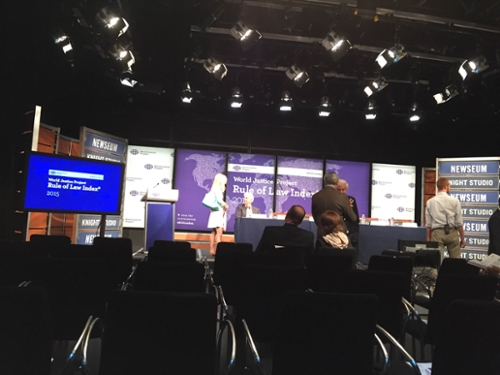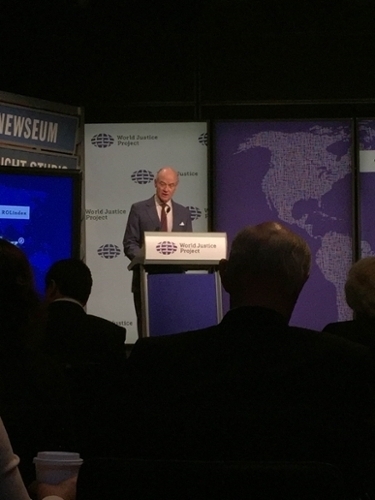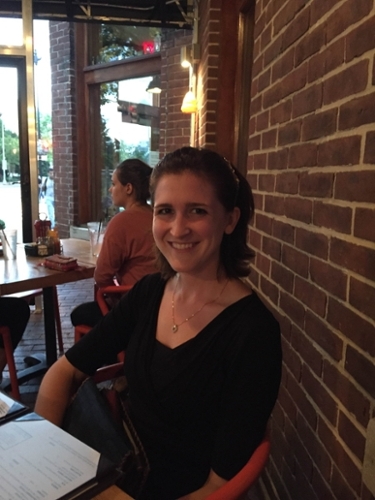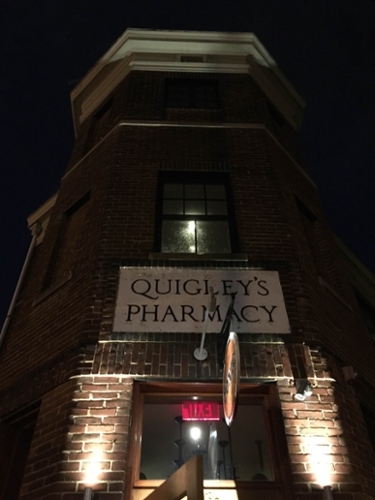Increasing My Knowledge About the Knowledge Gap

After a cancelled meeting with a group of Afghani LLM students on Monday morning, the INPROL team held a meeting to discuss my two supervisors' experiences at the UNDP Rule of Law meeting in New York City the prior week. On top of attending several panels about contemporary rule of law issues, they were able to meet with rule of law-related organizations to discuss how INPROL can be used as a universal hub for rule of law data. The result of these meetings were exciting - organizations were enthusiastic about further using INPROL as a resource in their rule of law work.
On Tuesday, the INPROL team invited me to the launch of World Justice Project's 2015 Rule of Law Index at the Newseum (pictured above). Speakers and panelists included several representatives from WJP and those in the rule of law field from Peru, South Africa, and the American Bar Association.

While the event was in an amazing venue (as a D.C. newbie, I had no idea how cool the Newseum would be), the most interesting part of the launch was the discussion that it generated. WJP's index is an attempt to give a snapshot of whether rule of law is being upheld in various sectors in the countries that it surveys. While the WJP representatives seemed optimistic that they had successfully measured rule of law - something that has often been viewed as intangible and immeasurable - I heard concerns over the methodology. WJP assesses the rule of law by interviewing citizens and rule of law experts in the three most populated cities in each country it evaluates. As one participant observed, perhaps the index would be more appropriately titled, the "Urban Rule of Law Perceptions Index." Confining perceptions of the rule of law to only the most populated areas may not paint the most accurate portrait of how people perceive the rule of law as a whole, especially in countries that have stark urban-rural divides. And as another participant noted - perceptions of the rule of law are a facet of the rule of law, but by no means encompass rule of law as a whole. The event left me with several questions - is a perceptions index truly the best indicator of rule of law that we have? How does one measure something as complex as the rule of law?
The next day, I was en route to attend another interesting event (one of the biggest perks of interning at USIP is that there are interesting events going on literally all the time), this one entitled "Fragility, Conflict, and Humanitarianism in the UN's New Goals." The title refers to the 17 Sustainable Development Goals that the UN just adopted to replace the Millenium Development Goals, which expire this year. Gideon Rose, an editor at Foreign Affairs was the moderator, with panelists including Ambassador Elizabeth Cousens from the UN Foundation; Nancy Lindborg, the president of USIP; David Miliband, the president and CEO of the International Resuce Committee; and Ambassador Linda Thomas-Greenfield, the assistant secretary of the Bureau of African Affairs at the State Department. As a tribute to just how much is going on at USIP at any given day, I was intercepted on my way to the event to help escort Afghani LLM students to an INPROL event instead. I ended up staying in the INPROL meeting with the Afghani LLM students and was truly impressed with their professional and academic backgrounds as well as their commitment to the rule of law in Afghanistan. They were leaving for Kabul within the next few days, and I am grateful I got to meet so many talented professionals who will to tackle the very real rule of law issues in Afghanistan in the years to come.
One of INPROL's remote staff members stopped in town from Australia on her way to Sweden for a conference. After work, my colleagues and went out so that she could experience cuisine that is uniquely American - Cajun food. I enjoyed getting to know my co-workers out of the workplace, and it was great to meet another member of the INPROL team.
For the rest of the week, I continued to map exisiting rule of law webinars and attend INPROL meetings, which continues to enforce the knowledge gap problem - there are literally hundreds of rule of law webinars exist, but they're scattered to the farthest reaches of the Internet. Outside of work, I have enjoyed checking out the local restaurants and exploring my surroundings, such as Embassy Row.




On Friday, a fellow William & Mary law student organized a W&M in D.C. get-together at Mission, so it was great to catch up with my classmates. Then, I headed down to Williamsburg for a pre-birthday celebration. All in all, a very good last week of being 24.
